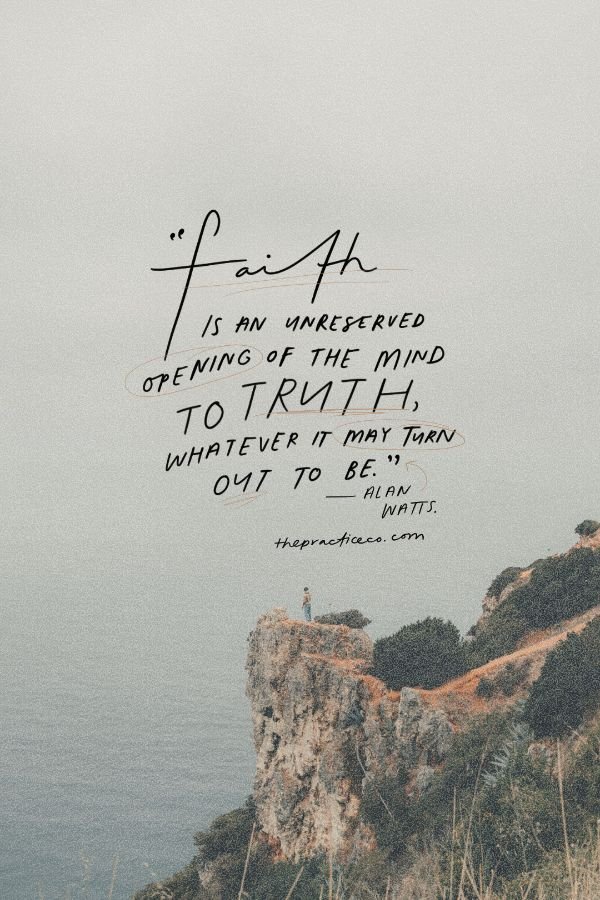Cooking the ‘Faith’ books…
Growing up in a Pentecostal faith tradition and community, I was taught that faith was the substance of things hoped for, the evidence of things unseen… taken straight from a little book in The New Testament called Hebrews.
It sounds lovely, right? But WHAT DOES IT ACTUALLY MEAN?
For me, it played out to mean that faith was the activity and function of believing something that you couldn't prove was real or true. In Sunday School, we were often told that if we could prove God existed and that Jesus was the world's saviour, it would eliminate faith, the very mechanism that Christianity hinged on, making it obsolete and numbing its power. Faith bridged the gap between what we know and what we believe.
I saw this in practice, and perhaps you have, too, in altar calls and prayers for healing and deliverance from various things like diseases and demons, in people making health decisions based on their faith in being whiz-bang healed rather than following a doctor's advice. I saw it in marriages filled with trauma and violence… 'let no man tear apart what God has set apart.' I saw it and see it still, in ideas of creationism, while the earth groans in pain and the faithful wait to be delivered from her ashess…
In small ways, too, in the details, faith trumped reason, faith trumped evidence, faith trumped good practice, faith trumped safety…
Alongside this warped practice of faith is confirmation bias, a cognitive shortcut used when gathering and interpreting information. Because taking in new information is time and energy-consuming, our brains look for shortcuts to make the process more efficient, to the point where we favour information that confirms our existing beliefs or values. We can find ourselves in a pattern of behaviour that seeks out, interprets, remembers, and gives more weight to evidence that supports our current views and beliefs while ignoring, dismissing, or undervaluing the relevance of evidence that contradicts them. What this means is that we learn to interpret life - from the smallest details to the biggest shifts - through the lens of what we already think we know, what we want to be true, what we need to be right to keep us as comfortable, safe, and pain-free as possible.
One of the main objectives of confirmation bias is to protect us from cognitive dissonance - the mental distress that comes from holding two conflicting beliefs, attitudes, values etc, inside of you or from experiencing something that subverts the dominant paradigm of your belief system. That twisting in your belly and brain is cognitive dissonance - you know something to be true, but you also know that something else is true, too, and it hurts. Confirmation bias seems to sidestep this phenomenon by only recognising and paying attention to things that support your current belief and value systems rather than contradicting them.
In this sense, it's not hard to imagine that we end up subconsciously cooking our own books so that they offer up the answers we think will serve us.
But it doesn't work.
I believe that there is a way to practice faith and critical awareness at the same time. There is a way to stay hopeful, full of wonder, and open to possibilities beyond our comprehension, and make careful, considered, data-based choices about how to spend our lives.
Because faith isn't dismissive of reality, and cognitive dissonance isn't your enemy.
Most of the work here at the Practice Co comes down to this: how do we take our divinity and our humanity seriously, together, at the same time, with a lightness that we can carry? How do we make it dance? How do we integrate all of our parts instead of feeling conflicted about having so many versions of ourselves alive within us at once?
Part of the practice is to welcome new insight and resist a bias that leans only towards what you think you know because there is always more, and none of it is a threat but a discovery of life happening in real-time, and isn't that what you want to be a part of? The ever-expansive nature of life unfolding? We talk about this more in this weeks series in The Practice Co App: Cooking the Books. It’s been one of my favourites to write, I’d love to know how it translates to you.
REMEMBER: "Faith is an unreserved opening of the mind to the truth, whatever it may turn out to be." Alan Watts.
See you in the App, xo
Liz Milani
Instagram: @thepracticeco
From this week’s series titled "Cooking The Books,," with a subscription in the App. Hope to see you there.


